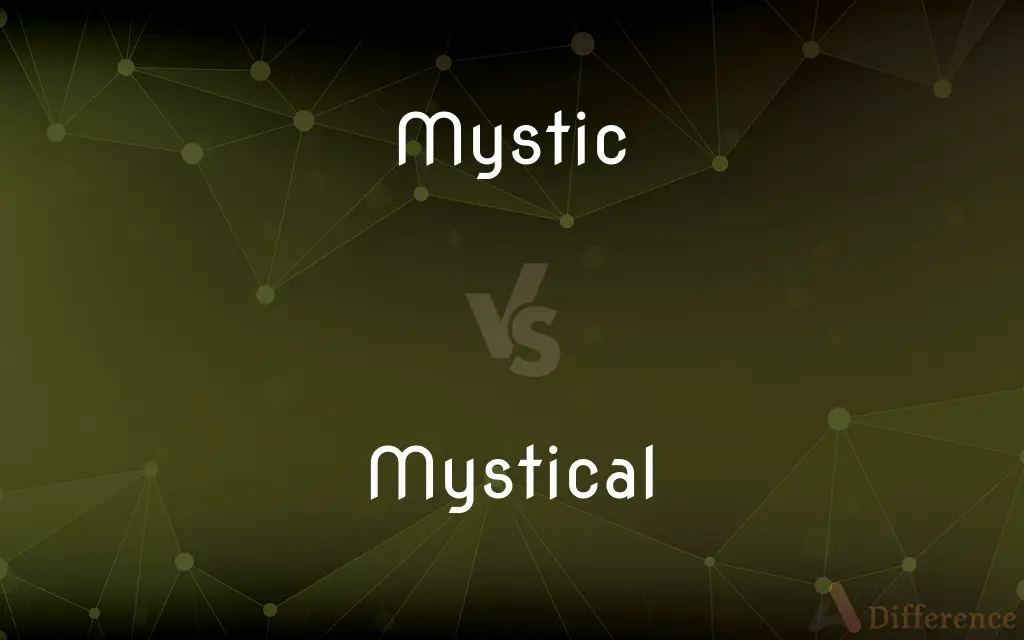Mystic vs. Mystical — What's the Difference?
Edited by Tayyaba Rehman — By Maham Liaqat — Updated on April 18, 2024
"Mystic" refers to someone deeply spiritual, focusing on achieving unity with the divine, whereas "mystical" describes experiences or aspects that are spiritual or transcendental in nature.

Difference Between Mystic and Mystical
Table of Contents
ADVERTISEMENT
Key Differences
"Mystic" often denotes a person who pursues direct communion with divine forces or realities, striving for a profound spiritual understanding. On the other hand, "mystical" is typically used as an adjective to qualify things or experiences that are esoteric, ineffable, or spiritually transcendent.
A mystic engages in practices aimed at achieving an intimate understanding of the cosmos and the divine essence, whereas mystical experiences might involve visions, profound insights, or other phenomena that are beyond ordinary understanding.
The journey of a mystic is deeply personal and often solitary, focusing on inner transformation and enlightenment. In contrast, mystical elements can be observed and shared in various cultural, religious, or philosophical contexts, influencing a broader audience.
Mystic traditions are found in many world religions, where individuals follow specific spiritual disciplines. Mystical, however, describes the nature of the experiences or the aspects of these traditions that elude conventional explanation.
Mystics are revered in various cultures for their deep spiritual wisdom and their unique ability to transcend ordinary experiences. Mystical qualities, however, are often associated with mysterious or supernatural aspects that can evoke both reverence and ambiguity.
ADVERTISEMENT
Comparison Chart
Definition
A person who seeks spiritual enlightenment
Pertaining to esoteric, spiritual experiences
Usage
Noun
Adjective
Focus
Personal spiritual journey
Nature of experiences
Perception
Often involves discipline and practice
Can be spontaneous or induced
Cultural Role
Specific individuals (e.g., saints, shamans)
Broadly applicable in various contexts
Compare with Definitions
Mystic
A person who practices or believes in mysticism.
The mystic spent years meditating in solitude.
Mystical
Related to the direct experience of the divine or transcendent reality.
His mystical experience left him forever changed.
Mystic
An individual who achieves spiritual insights, often through unconventional means.
The mystic could understand realities beyond normal perception.
Mystical
Describing phenomena that defy logical explanation.
The aurora borealis has a mystical quality that captivates many.
Mystic
Someone who seeks direct experience of the sacred or divine.
Mystics often report unique spiritual experiences during meditation.
Mystical
Associated with magic or supernatural elements.
The forest in the story is portrayed as a mystical place with enchanted beings.
Mystic
Someone deeply engaged in spiritual or esoteric pursuits.
She is considered a mystic because of her prophetic visions.
Mystical
Pertaining to hidden or secret spiritual practices.
The mystical texts were encrypted to protect their sacred knowledge.
Mystic
A figure revered in various religious traditions for their profound connection to the divine.
Historical texts describe him as a powerful mystic.
Mystical
Involving an inner revelation or spiritual awakening.
The retreat promised a mystical journey into self-discovery.
Mystic
Of or relating to mysticism or mystics
Mystic doctrines.
Mystical
Relating to mystics or religious mysticism
The mystical theology of Richard Rolle
Mystic
Deeply or mysteriously spiritual; mystical
Mystic experiences.
Mystical
Inspiring a sense of spiritual mystery, awe, and fascination
The mystical city of Kathmandu
Mystic
Of or relating to religious mysteries or occult rites and practices.
Mystical
Of, relating to, or stemming from mysticism or immediate understanding of spiritual matters, especially when experienced as direct communion with God
A mystical trance.
A mystical treatise.
Mystic
Inspiring a sense of mystery or wonder
A painting of a mystic landscape.
Mystical
Symbolic or allegorical, especially with regard to spirituality
A mystical interpretation of a parable.
Mystic
One who practices or believes in mysticism or a given form of mysticism
Protestant mystics.
Mystical
Awe-inspiring or mysterious
"Had his dabbling in the unknown awakened a liking for more mystical sounds, the magical conjuring of sea upon the shore?" (Daphne du Maurier).
Mystic
Of, or relating to mystics, mysticism or occult mysteries; mystical.
A mystic dance
Mystical
Believed or maintained with awe or deep respect, especially when contrary to or lacking factual evidence
Mystical theories about the securities market.
Mystic
Mysterious and strange; arcane, obscure or enigmatic.
Mystical
Of or relating to mystic rites or practices
Stones arranged in a mystical circle.
Mystic
Someone who practices mysticism.
Mystical
Relating to mystics or mysticism.
Mystic
Remote from or beyond human comprehension; baffling human understanding; unknowable; obscure; mysterious.
Heaven's numerous hierarchy spanThe mystic gulf from God to man.
God hath revealed a way mystical and supernatural.
Mystical
Having a spiritual or magical significance that transcends human understanding.
Mystic
Importing or implying mysticism; involving some secret meaning; allegorical; emblematical; as, a mystic dance; mystic Babylon.
Thus, then, did the spirit of unity and meekness inspire every joint and sinew of the mystical body.
Mystical
Inspiring a sense of spiritual mystery, awe, and fascination.
Mystic
Employing mysticism; as, mystical intuition; mystical explanations; - contrasted to logical, rational, analytical.
Mystical
Relating to or characteristic of mysticism;
Mystical religion
Mystic
One given to mysticism; one who holds mystical views, interpretations, etc.; especially, in ecclesiastical history, one who professed mysticism. See Mysticism.
Mystical
Relating to or resembling mysticism;
Mystical intuition
Mystical theories about the securities market
Mystic
Someone who believes in the existence of realities beyond human comprehension
Mystical
Having an import not apparent to the senses nor obvious to the intelligence; beyond ordinary understanding;
Mysterious symbols
The mystical style of Blake
Occult lore
The secret learning of the ancients
Mystic
Having an import not apparent to the senses nor obvious to the intelligence; beyond ordinary understanding;
Mysterious symbols
The mystical style of Blake
Occult lore
The secret learning of the ancients
Mystic
Relating to or resembling mysticism;
Mystical intuition
Mystical theories about the securities market
Mystic
Relating to or characteristic of mysticism;
Mystical religion
Common Curiosities
What defines a mystic?
A mystic is an individual deeply involved in spiritual understanding or practices aiming for a profound communion with the divine.
What are common features of mystical experiences?
Mystical experiences often feature profound personal revelations, feelings of oneness with the universe, or encounters with the divine.
Can anyone become a mystic?
Becoming a mystic typically involves a dedicated pursuit of spiritual disciplines and a deep personal transformation.
How do mystics share their experiences?
Mystics may share their experiences through writings, teachings, or spiritual guidance, though some experiences remain deeply personal and incommunicable.
How is mystical used in literature?
In literature, mystical is used to describe settings, themes, or events that are characterized by their spiritual or supernatural qualities.
Do all religions have mystics?
Most world religions have mystic traditions, though the practices and beliefs of mystics can vary widely between different faiths.
Is there a difference between religious and non-religious mystics?
Yes, religious mystics usually follow specific doctrinal frameworks, while non-religious mystics might engage in spiritual practices outside traditional religious contexts.
How do mystics achieve their spiritual status?
Mystics achieve their status through various means, including long periods of meditation, prayer, or other spiritual practices.
Can mystical experiences be induced?
Some mystical experiences can be induced through practices like meditation, psychedelic use, or ritualistic activities.
How does society view mystical phenomena?
Mystical phenomena are often viewed with a mix of reverence and skepticism, depending on cultural and personal beliefs.
Are mystical experiences subjective or objective?
Mystical experiences are largely subjective, rooted in personal spiritual insight and emotional states.
What is the significance of mystical symbols?
Mystical symbols are used to convey complex spiritual truths and insights, often in a form that is accessible to those within a particular spiritual tradition.
What role do mystics play in their communities?
Mystics often serve as spiritual leaders or advisors, offering guidance based on their profound insights and experiences.
What impact do mystical experiences have on an individual?
Mystical experiences can lead to significant personal transformations, often altering an individual's worldview and life path.
Can mystical experiences be scientifically explained?
While some aspects of mystical experiences can be studied, such as their effects on the brain, their transcendent nature often eludes complete scientific explanation.
Share Your Discovery

Previous Comparison
Engage vs. Participate
Next Comparison
Walk vs. MarchAuthor Spotlight
Written by
Maham LiaqatEdited by
Tayyaba RehmanTayyaba Rehman is a distinguished writer, currently serving as a primary contributor to askdifference.com. As a researcher in semantics and etymology, Tayyaba's passion for the complexity of languages and their distinctions has found a perfect home on the platform. Tayyaba delves into the intricacies of language, distinguishing between commonly confused words and phrases, thereby providing clarity for readers worldwide.
















































